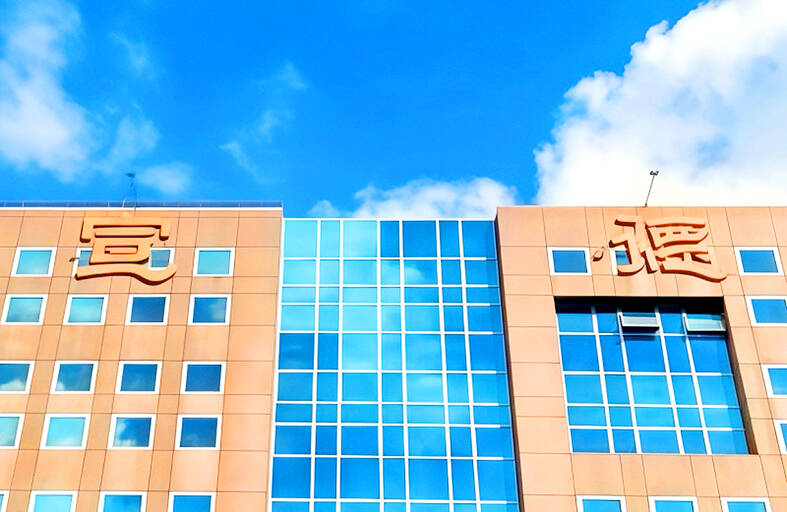Connector maker SpeedTech Corp (宣德) yesterday said it plans to expand capacity at its Mexico plant by year-end with six new surface-mount technology production lines, 14 injection molding machine lines and two assembly lines, company spokesman Ethan Hsu (徐嘉德) told an earnings conference in Taipei.
The expansion would support production of printed circuit controller boards for tier-one North American automotive customers, as well as point-of-sale terminals for a major North American mobile payment provider, Hsu said.
The company also expects to begin shipping new products to a US earphone customer next quarter from its Vietnam plant, focusing on true wireless stereo components and advanced connectors, he said.

Photo courtesy of SpeedTech Corp
SpeedTech, which supplies connectors and wiring harnesses, enclosures and plastic injection parts, operates plants in Taiwan, China, Malaysia, the Philippines, Vietnam and Mexico. Its major customers include Apple Inc and Tesla Inc.
Connectors are expected to generate 50 percent of SpeedTech’s revenue this year, with electronic components contributing 20 percent, and final assembly and other businesses accounting for the remaining 30 percent, he said.
SpeedTech expects revenue this year to be split 45 percent in the first half and 55 percent in the second half, he added.
Hsu said a US smartphone customer, which he declined to name, accounted for 45 percent of SpeedTech’s revenue last year.
Shipments to the customer have so far remained on par with last year, but mass shipments are to begin next month and continue through October, he added.
Although the third quarter is traditionally the company’s peak season, revenue is expected to hit its high in the fourth quarter on the back of mass shipments of a system assembly product, Hsu said.
SpeedTech reported first-half revenue of NT$10.92 billion (US$358.62 million), up 20 percent year-on-year.
However, the sharp appreciation of the New Taiwan dollar in the second quarter reduced revenue by about NT$100 million, he said.
As a result, the company reported a net loss of NT$105 million in the second quarter, the first quarterly loss in two years.
The company still posted a net profit of NT$82.67 million in the first half of the year, or earnings per share of NT$0.48.
Full-year revenue is expected to surpass last year’s level, supported by the company’s Mini Cool Edge IO products, Hsu said.
The products are designed and partly manufactured in Taiwan, with the first batch of samples submitted for authentication yesterday and mass production slated for next year, he added.

NEW IDENTITY: Known for its software, India has expanded into hardware, with its semiconductor industry growing from US$38bn in 2023 to US$45bn to US$50bn India on Saturday inaugurated its first semiconductor assembly and test facility, a milestone in the government’s push to reduce dependence on foreign chipmakers and stake a claim in a sector dominated by China. Indian Prime Minister Narendra Modi opened US firm Micron Technology Inc’s semiconductor assembly, test and packaging unit in his home state of Gujarat, hailing the “dawn of a new era” for India’s technology ambitions. “When young Indians look back in the future, they will see this decade as the turning point in our tech future,” Modi told the event, which was broadcast on his YouTube channel. The plant would convert

‘SEISMIC SHIFT’: The researcher forecast there would be about 1.1 billion mobile shipments this year, down from 1.26 billion the prior year and erasing years of gains The global smartphone market is expected to contract 12.9 percent this year due to the unprecedented memorychip shortage, marking “a crisis like no other,” researcher International Data Corp (IDC) said. The new forecast, a dramatic revision down from earlier estimates, gives the latest accounting of the ongoing memory crunch that is affecting every corner of the electronics industry. The demand for advanced memory to power artificial intelligence (AI) tasks has drained global supply until well into next year and jeopardizes the business model of many smartphone makers. IDC forecast about 1.1 billion mobile shipments this year, down from 1.26 billion the prior

People stand in a Pokemon store in Tokyo on Thursday. One of the world highest-grossing franchises is celebrated its 30th anniversary yesterday.

Zimbabwe’s ban on raw lithium exports is forcing Chinese miners to rethink their strategy, speeding up plans to process the metal locally instead of shipping it to China’s vast rechargeable battery industry. The country is Africa’s largest lithium producer and has one of the world’s largest reserves, according to the US Geological Survey (USGS). Zimbabwe already banned the export of lithium ore in 2022 and last year announced it would halt exports of lithium concentrates from January next year. However, on Wednesday it imposed the ban with immediate effect, leaving unclear what the lithium mining sector would do in the